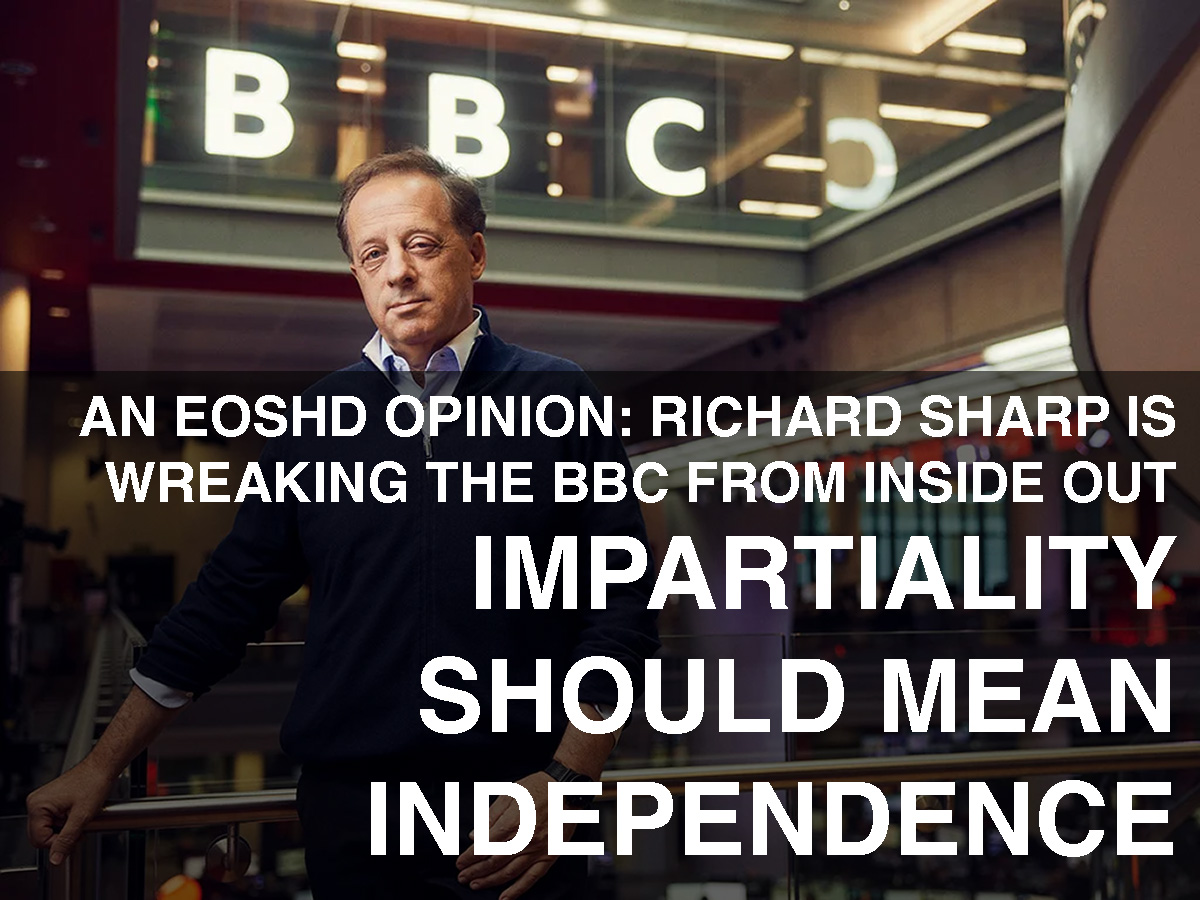
The idea of editorial independence was enshrined in the BBC’s founding Royal Charter in 1927, which stated the corporation should be “independent in all matters of internal control.” This was a way of ensuring the BBC’s coverage was not subject to political interference or pressure from any external sources such as the government.
Now the editorial independence of the BBC is at best completely neutered by the Conservative Party. Many talented journalists have left. In many respects the best news organisation in the world has taken to sourcing stories purely from Twitter and social media.
At the founding of the BBC nearly 100 years ago, the organisation had a neutral political stance, which is difficult to do today because it is run by a corrupt Conservative Party. The Chairman facilitated a loan for Boris Johnson to get him out of trouble. The Director General is keen to remind all who work under him at the BBC that impartiality means more coverage of the Conservative Party, more mentions of the Conservative Party and more representation of the Conservative Party and the more right wing views the better.
Indeed impartiality is very easy to twist. All you have to do is not apply it very equally. Liberal voices are policed and micromanaged even outside of work, told to stay out of politics. Right wing voices are allowed to say pretty much whatever they want whilst working for the BBC.
It is probably true that because the BBC is a creative endeavour it attracts people with a more liberal open minded view of society. As a group of people it has a natural bias towards the centre-left. The original idea of impartiality was that the corporation as a whole shouldn’t express opinions. There was nothing to stop those who worked for it being interested in the facts. Staff needed to be independent from government bias or control. These staff should fulfil their BBC’s duties and provide objective, factual and comprehensive accounts of current events and of public opinion. It is needed today more than ever.
Yet these days you can’t talk about the wrong kind of facts on the BBC, it will get you fired.
Impartiality has also morphed into giving two extremes air time and calling this a balance. It’s not journalism. The duty of a journalist is to get to the truth, however inconvenient for the government. BBC journalists had teeth. They were a big part of the checks and balances in our democracy. They kept all government figures in check and did not kowtow to those in power.
The weakening of the BBC comes at a time when the British government is undermining all the great UK public services, so it doesn’t come as much surprise. A large part of the quality of life in my country stems from having strong public services and in terms of TV, radio, news and journalism the BBC was world leading. With a strong BBC you have a well informed British society and global soft power. This so-called well informed society is today unrecognisable for most people living in the UK, we are used to living in a state of total and utter shambles and absurdity.
A strong BBC matters because it is not just about having something to watch on tele. It matters culturally, with added upside of lending the country some political stability. An informed public means it can see through nonsense politics like Brexit. Brexit was built on an enormous number of lies, with outcomes around a divided EU supported by Putin, and the BBC simply parroted these or countered these with the other extreme of bias, without doing objective impartial journalism from the centre.
The BBC was never meant to be a mouthpiece of the ruling political party of the day and its undermining has come at a bad time. Like our friends over the pond, we in the UK seem to be grappling with the question of “what is real any more”? We’ve gone down the rabbit hole of nothing is true and everything is possible, which seems to be particularly empowering for governments and corporations. The overall ethos today of the UK is changing from a country known for being a compassionate melting pot of entrepreneurial people, great universities and well funded public services, to a country where nothing is true, and everything is possible if you have an absolute shedload of money.
Reality for the rich, powerful and those in control of the government has become whatever they make it, which conveniently for the Conservative Party is a reality composed almost entirely of bullshit and personal opinions.
The objective reality the rest of us paupers abide by, that form of reliable certainty that can be proven with hard evidence is for the birds. We also now have to navigate a severe resulting culture war driven by all these stupid personal opinions and social media posts, with disastrous consequences for society.
So the challenge for the impartial BBC of presenting actual reality today (and to avoid turning into something akin to a Russian state owned TV station) is the challenge of capturing attention, and one of trust. Currently the BBC is losing both. Under the guise of impartiality, presenters are merely leaving it up to the audience to side with one extreme or another unchecked. It leads to a divided and unhappy country.
There are facts on both sides of an argument, and it doesn’t help when people are forced to pick a side as if they’re watching a football match.
It really matters more than we think. If you don’t have millions of people watching the BBC they are watching social media instead. This leads to a country being open to opportunism and exploitation. A gullible and angry public will end up voting for opportunistic liars like Boris Johnson or Nigel Farage.
Indeed, fascists are experts at throwing in a few facts to lend legitimacy to lies. It is the job of journalists to expose this and the job of the BBC to prioritise this in their broadcasting; Tell the public why these people claim to believe in what they do and what kind of self-serving hidden agendas and vested interests they have.
During the Brexit referendum, the British media failed to tell us any facts at all and all the emphasis was on the personal views of individuals, and not why they believed what they did. It was a gross failure of journalism. It was less a referendum, more a 6 month talk show.
Granted this is the BBC’s other role – entertainment – which is today merely about grabbing attention. For many decades the BBC was a form of escapism. They kept politics out of entertainment. With the satire and comedy of the 80s this began to change and it was for the better.
There are two ways of informing society – you can be a talking text book, dry and impersonal, or you can bring personalities into it, subjective beliefs and campaigner figures to liven things up. But by bringing in these big celebrity personalities and extreme characters, you belittle the complexity of reality. You dumb it down.
It is getting people to fight that works best as entertainment, and perhaps this is the reason why so many of the British public can no longer tell the difference between facts and opinions, news or entertainment.
A statement of fact is now interpreted as personal opinion. Everything has become personal.
It’s now all about the individual rather than the substance or context of their beliefs. As a BBC freelancer you might one day factually compare the language of the British governments to the Nazi party in 1930s Germany, only for your government paymasters to complain that “personal beliefs” have no place in your own personal Twitter feed if you want to work for the BBC. Of course the intention is to scare employees and censor them outside of work. It is a stealthy way to tell somebody to stop talking about the facts without mentioning the facts.
In fact BBC presenters telling the truth is the core of the original charter. Independence is the original meaning of impartiality.
To be a journalist is like being a detective. The big question for our times is how so many journalists have allowed themselves to become shills for powerful entities like governments and corporations – client journalists. It’s like being held captive, or under a spell.
Those original BBC values were also the values I followed at EOSHD. When 99% of the camera industry press were writing ad-copy in disguise, I wasn’t interested in doing the same. I have always found it completely baffling what the attraction is of it, but I soon discovered the majority were keener to rub shoulders with the people who controlled the ad revenue and camera PR. It took me a long time to recognise the dilemma of these captive puppets. We all want career progress, money and opportunity and there is nothing wrong with that, but to go about getting these differs depending whether you are operating according to your own principals with an independent income or under a broken dystopian corporate totalitarianism. For many operating in today’s corrupt dystopian climate you’d have to be mad to expose the truth. There are enormous personal consequences. To expose the truth is to fear for your job, as Gary Lineker is currently finding out.
The wonderful thing is that by making a stand, you can take a lot of people with you and fight for what so many people recognise as the truth. There are thousands of people who work for the BBC who are sick to the back teeth of the current Tory cronyism from high up.
Hopefully this can be the mutiny that leads to a reform of the BBC and allows them to get back their journalistic teeth, independent from the worthless shills in the Conservative Party.



